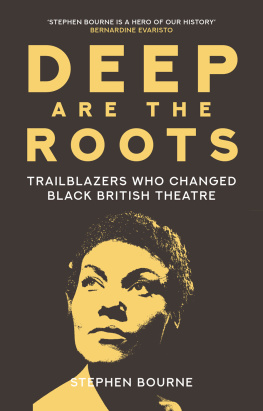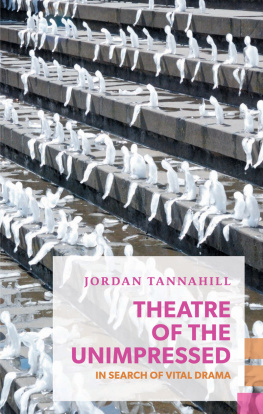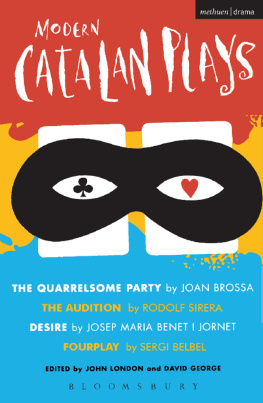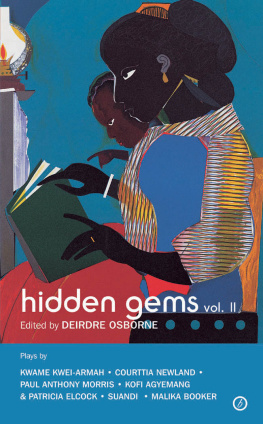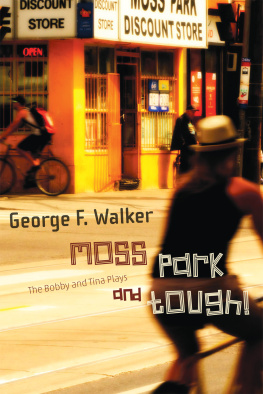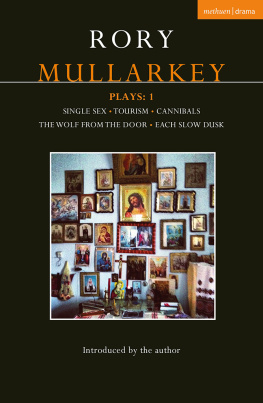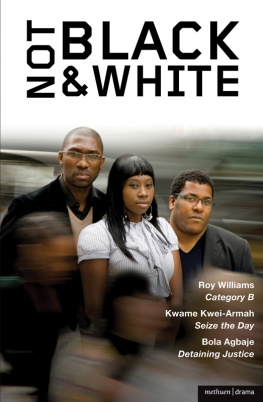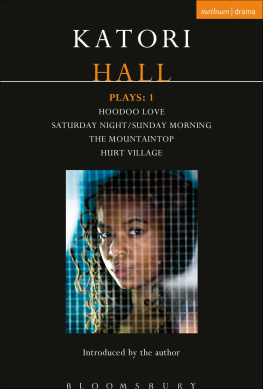Kwame Kwei-Armah
Plays: 1
Elminas Kitchen, Fix Up,
Statement of Regret, Let There Be Love
Elminas Kitchen: This is an angry, provocative, vital play, one that demands change in society while recognising that there are no easy solutions, and is passionately political while understanding that the best way to communicate with people is to keep them entertained. Guardian
Fix Up: What is striking about [Kwei-Armahs] richly eloquent new play is that it deals with a subject that has specific racial resonances but a wider application: the sacrifice of historical identity to the insatiable demands of brute commerce... Kwei-Armah builds a philosophical argument out of a practical problem. Guardian
Statement of Regret: The play is unashamedly political, driven by dialectic, and bravely provocative: it brings sensitive questions from and about the black community in Britain... to the stage. It focuses on the continuing legacy of the slave trade and how best to overcome it. It champions debate and celebrates discussion, is honest, quizzical and daring. Financial Times
Let There Be Love: Initially, [the play] looks like an amusing study of racial and generational tolerance, in which a cantankerous old Caribbean Londoner establishes a rapport with his young, Polish cleaner that he cant find with his two daughters. But it ranges far wider and deeper than that, decisively transcending issues of race. In a series of surprising turns, Let There Be Love delves into domestic violence and illness, as well as gender and sexuality, dignity and death, without ever losing its sense of humour. Evening StandardKwame Kwei-Armah won the Peggy Ramsay award for his first play, Bitter Herb (1998), which was subsequently put on by the Bristol Old Vic, where he also became writer-in-residence. He followed this up with the musical Blues Brother, Soul Sister which toured the UK in 2001. He co-wrote the musical Big Nose (an adaptation of Cyrano) which was performed at the Belgrade Theatre, Coventry, in 1999. In 2003 the National Theatre produced the critically acclaimed Elminas Kitchen for which in 2004 he won the Evening Standard Charles Wintour Award for Most Promising Playwright, and was nominated for a Laurence Olivier Award for Best New Play 2003. Elminas Kitchen has since been produced and aired on Radio 3 and BBC4. His next two plays, Fix Up and Statement of Regret, were produced by the National Theatre in 2004 and 2007. He directed his most recent play, Let There Be Love, when it premiered at the Tricycle Theatre, London, in 2008. He received an honorary doctorate from the Open University in 2008.
Plays: 1
Elminas Kitchen Fix Up Statement of Regret Let There Be Love
with an introduction by the author
KWAME KWEI-ARMAH

Contents
1998 | Bitter Herb (winner of the Peggy Ramsay Award) premieres at the Bristol Old Vic, directed by Andy Hay. |
1999 | Big Nose, co-authored and directed by Chris Monks, premieres at the Belgrade Theatre, Coventry. |
2001 | Blues Brother, Soul Sister is produced by the Bristol Old Vic; national tour directed by Andy Hay. |
2003 | Elminas Kitchen premieres at the Cottesloe, National Theatre, directed by Angus Jackson. Wins the Evening Standard Charles Wintour Award for Most Promising Playwright, nominated for an Olivier Award and for a BAFTA (Best New Writer). The play was produced as a film for BBC4 Drama (2003) and BBC Radio 3 (2004), and transferred to Londons Garrick Theatre, becoming the first play by an African Caribbean playwright to be produced in the West End. |
2004 | Fix Up premieres at the Cottesloe, National Theatre, directed by Angus Jackson. |
2007 | Statement of Regret premieres at the Cottesloe, National Theatre, directed by Jeremy Herrin. |
2008 | Let There Be Love premieres at the Tricycle Theatre, London, directed by the author, and returns for a second run in the summer of the same year. Television drama Walters War is produced by BBC4. |
2009 | Statement of Regret produced by BBC Radio 3. |
While writing a new play I play a game with myself. I pretend that all of the plays I have written to date do not exist. The successes and the failures, the narrative arcs and themes, all must be banished to a place that cannot easily be reached in the vain hope of fooling myself that whatever I am writing at present is not connected to or part of a world I have ever visited before. Of course this is nonsense, for more than anything else I long to connect the dots, to find the link between each play and the circumstances I find myself in mentally or spiritually, but it is something I must do.
I have just got to the end of a new play (you never get to the end but you know what I mean, right?) and as I write this have no idea whether it will be accepted or not, produced or designated to the bottom drawer forever. But as these few days, the grace period between completion and submission, are the last days of peace I will have until I hear back from the theatre, it is the perfect time for me to speak of the narratives that have brought me to this juncture.
The existence of these four plays and notably the triptych produced by the National Theatre Elminas Kitchen, Fix Up and Statement of Regret changed the trajectory of my life. Let There Be Love solidified me in another way, but I shall return to that later.
Elminas Kitchen
I was driving home one evening to the flat in Hackney where I then lived, when I drove past a gleaming metallic green new BMW wrapped around a lamppost. When I got home I saw on the news that there had been a shooting in Hackney then dubbed Murder Mile for the number of black-on-black shootings that had occurred over the previous few years. They then cut away to the green BMW and the newscaster reported that two men had been fatally shot: one died immediately, the other who tried to crawl away from the vehicle died later in hospital. It had all the hallmarks of another black-on-black attack. This pained me to my core. I had grown up in a Britain where it was white youths that attacked my community; when I saw another black youth I would nod a kind of acknowledgement, I would feel safer in the knowledge that if I were to be attacked there was someone close by to help me. Now, young blacks were more afraid of being attacked by someone who shared the hue than by an extreme right-wing National Front member, or, slightly later, BNP skinhead.
It had been ingrained in me as a child by my brilliant mother that whatever occupation I found myself in, serving the greater community through that occupation had to be a goal, an aim. Anything less was selfishness. But how could I serve discuss this new blight that had taken hold of our young through my chosen profession, that of the artist? That night before I slept I wrote the first scene of Elminas Kitchen. Actually it wasnt the very first scene that is in the script as often happens that scene didnt make the final script but the idea of writing, of seeking to look beyond headlines to ask fundamental questions of our young men, was born: why were they not trying hard enough to overcome their circumstances, and why was society not trying hard enough to remove the circumstances they had to transcend?
Next page

